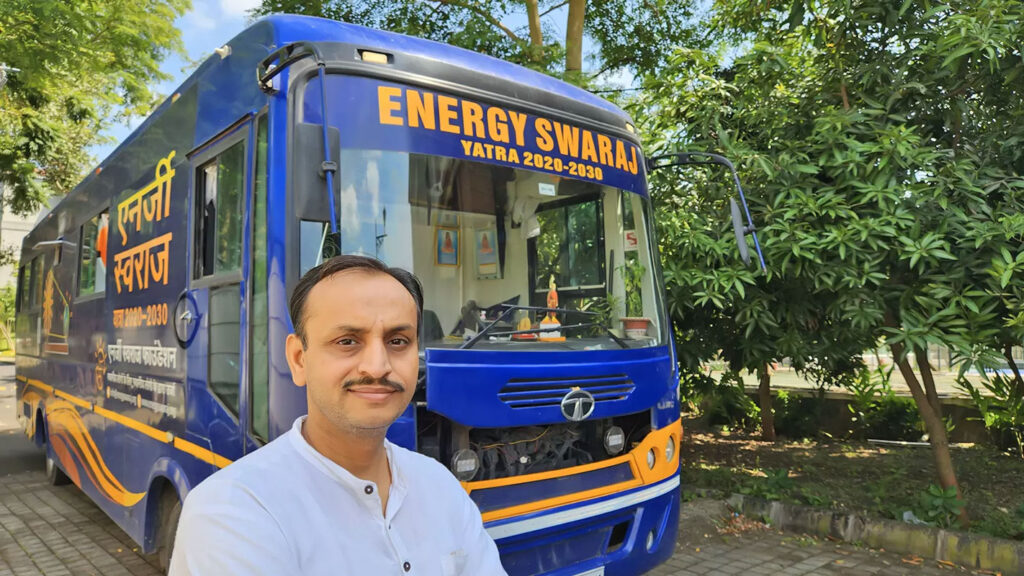With summer upon us, keeping cool is a big concern and the subject of much discussion. For those trying to follow a sustainable lifestyle, it is much more challenging to figure out how to save the planet by consuming less energy, yet tide over the hot summer months in reasonable comfort.

This time I thought it best to speak to an authority on the subject. Professor Chetan Solanki from IIT, Mumbai, popularly referred to as ‘Solar Gandhi’, is on an ‘energy swaraj yatra’. He has been living in a self-designed solar-powered vehicle for the past four and a half years, and moves from one geographical location to another educating people, institutions, governments, anyone who wants to listen to him about the importance of reducing energy consumption and saving the planet for generations to come. He uses only solar energy to cook meals for himself and his small team that lives and moves with him.
Solanki quit his teaching profession to dedicate 11 years of his life to spreading the word of how rapidly the climate is changing and if we do not do anything about it, our children are doomed to a miserable existence.
He has simple thoughts which run deep. He wants people to realise that, though technology, businesses, consumption and populations are growing, the planet’s size will never grow. It is finite and so are soil, water and land resources. If we do not stop exploiting them beyond their capacity and allow greenhouse gases to warm our planet, life on earth itself is threatened. In fact, according to data from the Centre for Science and Environment, 2024 was the warmest year on record, with the global average temperature at 1.6 degrees Celsius above the pre-industrial level. A very worrying reality.
Over the last many decades, we have been choosing short-term gain, he says, and that’s what has led to climate change, which is set to create even more climate-related disasters such as floods, cyclones and heatwaves. This in turn will create extensive havoc in terms of loss of lives, damage to infrastructure, property, agriculture and threaten our food security as well. If we instead choose short-term pain, it will translate into long-term gain for our children. “Comfort and convenience are a double-edged sword,” he reiterates emphatically.
Instead of looking up to people who travel in BMWs and consume beyond their needs, we need to value people who consume less.
So, what does he suggest we do to beat the summer heat, and simultaneously work towards saving the planet? Though his solutions may sound drastic to many, they are worth listening to and emulating if one can commit oneself. Prof Solanki, of course, does not believe in using air-conditioners, and uses a cooler instead in his retrofitted vehicle. He points out that ACs may improve the air quality and provide indoor comfort, but they guzzle energy, drive up temperatures and contribute to the climate crisis. The refrigerants used in them, particularly hydrofluorocarbons (HFCs), are potent greenhouse gases that add to air pollution and help create what is known as the urban heat island effect.
However, for those who just cannot live without an AC and insist on switching it on, he suggests keeping it at 26 degrees or even better, 27 degrees Celsius to create the least climate impact. He recalls how he has seen people using ACs at 18 degrees Celsius and sleeping under a blanket to stay warm, an action that has little logic.
A friend of mine has a suggestion regarding sensible use of ACs. He says closing windows and doors, and switching on the machine at 26° C, 15 minutes before using a room, helps cool things down and prevent you from reaching for the remote and turning the AC to 18° C because the room is too hot and needs to be quickly cooled! Very often, people go off to sleep without adjusting the temperature.
With summer, all water and juice bottles go into the refrigerator. Instead of cooling water in a fridge, the good professor suggests using the potter’s traditional ‘matka’, which has been used for centuries to keep water cool and fresh. Water, he says, takes very high energy to cool or heat. Why not drink cool water stored in earthenware like our ancestors did, he suggests.
Closing windows and doors, and switching on the AC at 26° C, 15 minutes before using a room, helps keep the room temperature down.
He says that though we are trying to find solutions in shifting to solar power, electric vehicles, charging stations, artificial intelligence etc, in the long run these will become part of the problem. We will have to deal with solar panel waste, battery waste, data centres guzzling energy and water, water and air pollution. The better way to deal with climate issue is to cut consumption. So, if you genuinely want to pursue a green lifestyle, he suggests we pledge not to buy clothes for a year as we already have enough of them, reduce ironing clothes as that is energy intensive, repair your shoes, bags and gadgets instead of throwing them away and buying new ones. If we go for holidays nearby, instead of travelling great distances, and if we purchase only what is needed, we could make a difference.
“There needs to be a change in perception. Instead of looking up to people who travel in BMWs and consume beyond their needs, we need to value people who consume less… only a public movement can do this,” he emphasises. And while he intends to live away from home in his vehicle for seven more years to spread the message, he hopes many others may join him by consuming less, switching off ACs, and be mindful of the lifestyle they pursue. His website (https://energyswaraj.org/) serves as a guide. Perhaps this summer could be the right time to take the pledge!
The writer is a senior journalist who writes on environmental issues





